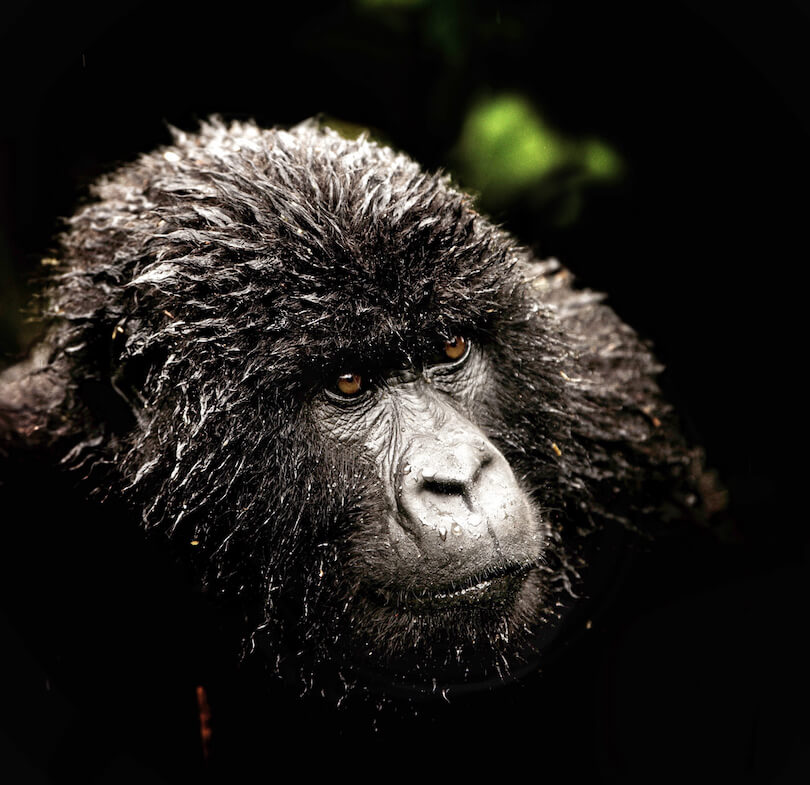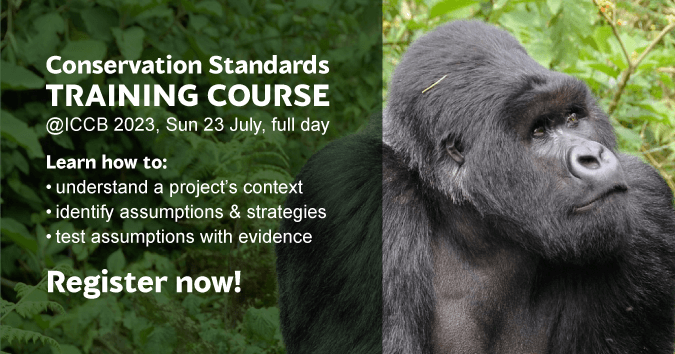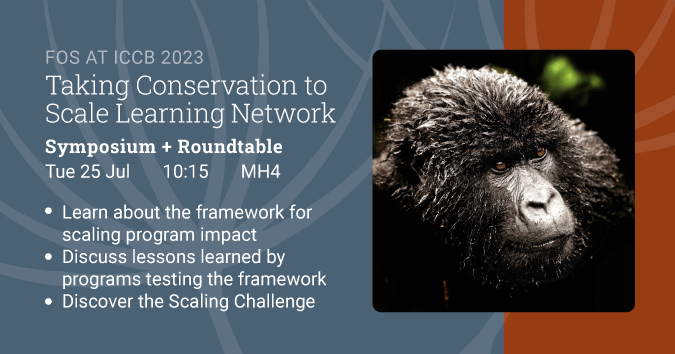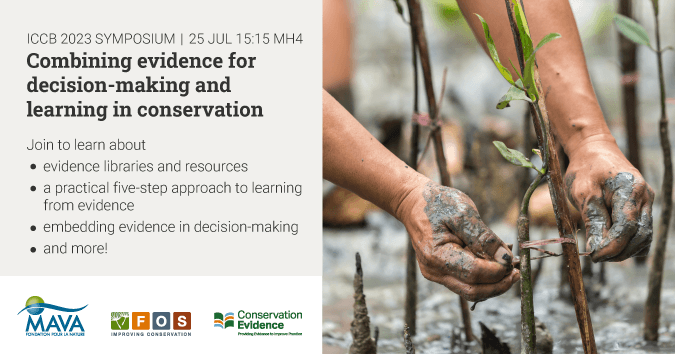
FOS at ICCB 2023
Foundations of Success is gearing up for the SCB's 31st International Congress for Conservation Biology (ICCB 2023)! We'll be at the congress in Kigali, Rwanda bringing you some of our newest insights and most trusted tools.
Find us here:
-
- Training course in the Conservation Standards: Learn to Assess your Conservation Effectiveness: An Introduction to the Conservation Standards (organizer: Jaclyn Lucas, Foundations of Success)
- Symposium with roundtable: Taking Conservation to Scale Learning Network: Six Real-World Conservation Programs Test a Framework for Scaling Their Impact (chair & organizer: Nick Salafsky, Foundations of Success)
- Symposium: Combining evidence for decision-making and learning in conservation (chair & organizer: Nico Boenisch, FOS Europe)
- Exhibition hall booths: Conservation Measures Partnership and Miradi software
Learn to Assess your Conservation Effectiveness: An Introduction to the Conservation Standards (Training course)

Sunday 23 July, 8:30–17:00 (full-day training)
Organizer: Jaclyn Lucas, Foundations of Success
This training will introduce participants to accessible and practical tools to support them in project planning, management, monitoring, and adaptation. We will use the Open Standards for the Practice of Conservation (Conservation Standards) – a widely adopted set of practices and principles – to guide participants through an adaptive management framework. The training will use a practical example and focus on two key Conservation Standards tools: situation models (which lay out the current context of a project) and theories of change (which map assumptions about how priority strategies are expected to lead to conservation success).
Through this training, participants will gain an understanding of how to support teams to develop a shared understanding of their conservation context, identify potential strategies, and clarify indicators to measure strategy effectiveness and conservation impact. This is a hands-on, interactive training hosted by the Conservation Measures Partnership (CMP) that aims to connect participants to the wider conservation planning and adaptive management community and share a library of tools to support real-world conservation work.
REGISTRATION CLOSED How to register: Find the Pre-Congress Sessions page in the congress registration process and scroll to Full-Day (8-Hour) Courses. Tick the box for Training Course 17: Learn to Assess your Conservation Effectiveness: An Introduction to the Conservation Standards.
Taking Conservation to Scale Learning Network: Six Real-World Conservation Programs Test a Framework for Scaling Their Impact (Symposium with roundtable)

Tuesday 24 July, 10:15–13:30, meeting hall 4
Chair & Organizer: Nick Salafsky, Foundations of Success
The magnitude of the issues that we collectively are facing in conservation – global loss of biodiversity, land-use change, invasive species, and climate change – means that we cannot simply focus on individual projects. Instead, we need to take action more effectively across the much larger range of program scales needed to address these global issues.
The Taking Conservation to Scale Learning Network has been working with six real-world conservation programs to develop and test a framework for how to achieve impact at scale more systematically. This framework has combined five scaling approaches with both behavior change and networking theory.
In this symposium, we will summarize our overall framework, present examples and lessons learned from our partner programs, and share some key findings that are starting to emerge from this work including:
- Our initial five scaling approaches have generally been validated, but with some refinements,
- Applying behavior change theory is essential to our scaling framework,
- Selecting the right combination of scaling approaches requires “systems-first” thinking,
- Using network theory provides tantalizing potential for going to scale, but is challenging to put into practice, and
- There is a great opportunity to scale our scaling work in conservation and beyond.
Presentations
- A Systems-First Approach for Taking Conservation to Scale (Nick Salafsky, Foundations of Success; Judy Boshoven, Foundations of Success; Annette Olsson, FOS Europe; Varsha Suresh, MS Environmental Conservation, Research Associate, Foundations of Success)
- Scaling Fish Forever: Community-Based Marine Resource Management in Mozambique and Around the World (Atanasio Joao Brito, PhD, Vice President, Fish Forever, Mozambique, Rare; Claudia Quintanilla; Nikki Schulman; Rocky Sanchez-Tirona)
- Scaling Indigenous-led conservation by increasing access for IP & LCs to the Conservation Standards (Frank Weisenberger, Community of Practice Indigenous CS Projects; Anne Ntongho, WWF Cameroon)
- Scaling Regenerative Row Cropping Systems in North America through Peer Learning Networks (Mary Fales, The Nature Conservancy; Kris Johnson)
- Developing and Assessing a Framework for Taking Conservation to Scale (Varsha Suresh, MS Environmental Conservation, Research Associate, Foundations of Success; Annette Olsson, FOS Europe; Nick Salafsky, Foundations of Success)
- Stopping Illegal Killing of Birds (IKB) in the Mediterranean Region (Nadia Sideri-Manoka, Environmentalist, MSc, Hellenic Ornithological Society; Georgia Panagiota Alexopoulou, Media & Communications Officer, HOS / BirdLife Greece)
Combining evidence for decision-making and learning in conservation (Symposium)

Tuesday 24 July, 15:15–16:45, meeting hall 4
Chair & Organizer: Nico Boenisch, FOS Europe
The conservation community has been on a quest for evidence-based conservation practice for two decades. Two approaches are fundamental:
- Collecting/curating existing published evidence in online libraries and databases
- Developing best practices that increase the rigour of project- and programme design to improve conservation practice through adaptive management
These efforts have been instrumental in shaping how the community thinks about evidence today and helped establish some necessary enabling conditions for evidence generation and use in practice.
However, much evidence remains hidden in people's brains or organisational filing systems. Although we are getting strong in making evidence accessible, practitioners often struggle to collect, generate and use evidence. The Conservation Learning Initiative tackles both of these challenges. We have created a practical five-step approach to combine evidence from practice and published sources to learn jointly and improve decision-making.
In this symposium, we will
- provide a vision for an evidence revolution
- review the range of libraries and resources to access evidence
- present a practical five-step approach to learning from evidence
- explain how the assessment and compilation of evidence can be embedded in decision-making, and
- reflect on evidence-based learning for conservation partnerships & alliances.
Presentations
- The evidence crisis and the evidence revolution (William Sutherland, University of Cambridge)
- Accessing evidence – the diversity of evidence libraries and platforms (Stephan Michael Funk, PhD MSc MSc, Chief Science Officer, Lemu; Marc Cadotte, University of Toronto; Steven Cooke; Nick Salafsky, Foundations of Success; William Sutherland, University of Cambridge; William Morgan, Postdoctoral Research Associate, University of Cambridge)
- The Conservation Learning Initiative – evidence-based learning on key conservation actions (Nicolas Boenisch, Co-Director / Conservation Strategist, FOS Europe)
- Assessing & Compiling Diverse Evidence Sources for Decision-making in Conservation (William Morgan, Postdoctoral Research Associate, University of Cambridge)
- Translating learning outcomes into practice: Conservation partnerships & alliances in West Africa (Charlotte Karibuhoye Said, MAVA Foundation)
Learn about the Conservation Standards and Miradi Adaptive Management Software
Come visit the double booth for the Conservation Measures Partnership and Miradi in the exhibition hall! We’ll be there all day, Monday to Thursday.

